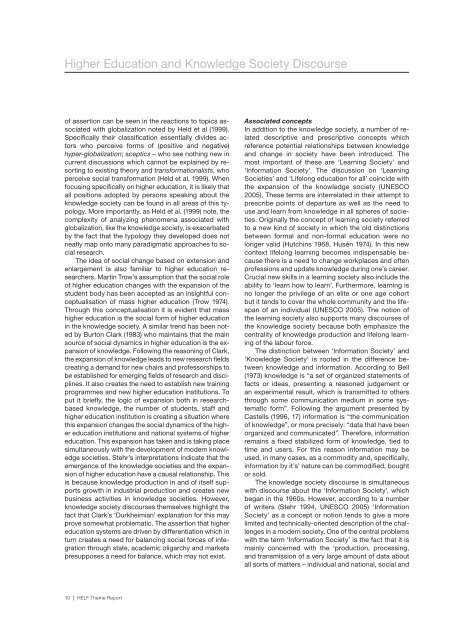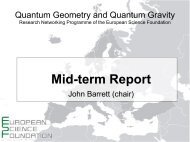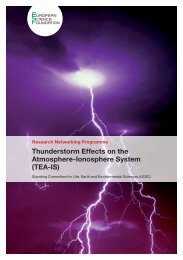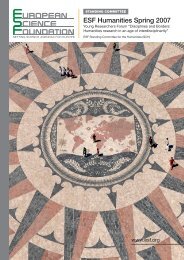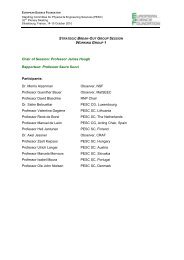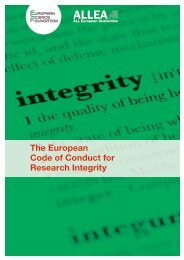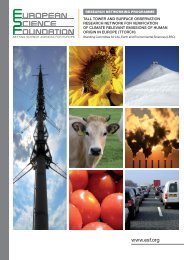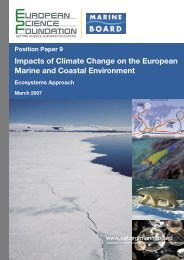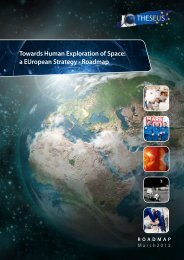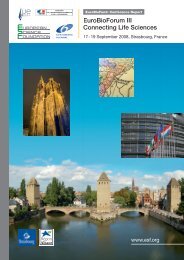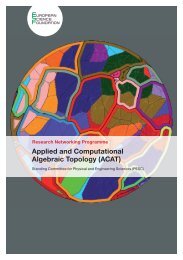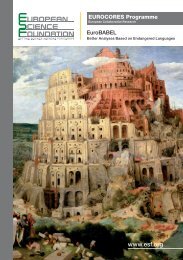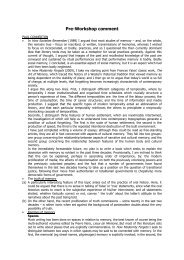Report - European Science Foundation
Report - European Science Foundation
Report - European Science Foundation
Create successful ePaper yourself
Turn your PDF publications into a flip-book with our unique Google optimized e-Paper software.
Higher Education and Knowledge Society Discourse<br />
of assertion can be seen in the reactions to topics associated<br />
with globalization noted by Held et al (1999).<br />
Specifically their classification essentially divides actors<br />
who perceive forms of (positive and negative)<br />
hyper-globalization; sceptics – who see nothing new in<br />
current discussions which cannot be explained by resorting<br />
to existing theory and transformationalists, who<br />
perceive social transformation (Held et al. 1999). When<br />
focusing specifically on higher education, it is likely that<br />
all positions adopted by persons speaking about the<br />
knowledge society can be found in all areas of this typology.<br />
More importantly, as Held et al. (1999) note, the<br />
complexity of analyzing phenomena associated with<br />
globalization, like the knowledge society, is exacerbated<br />
by the fact that the typology they developed does not<br />
neatly map onto many paradigmatic approaches to social<br />
research.<br />
The idea of social change based on extension and<br />
enlargement is also familiar to higher education researchers.<br />
Martin Trow’s assumption that the social role<br />
of higher education changes with the expansion of the<br />
student body has been accepted as an insightful conceptualisation<br />
of mass higher education (Trow 1974).<br />
Through this conceptualisation it is evident that mass<br />
higher education is the social form of higher education<br />
in the knowledge society. A similar trend has been noted<br />
by Burton Clark (1983) who maintains that the main<br />
source of social dynamics in higher education is the expansion<br />
of knowledge. Following the reasoning of Clark,<br />
the expansion of knowledge leads to new research fields<br />
creating a demand for new chairs and professorships to<br />
be established for emerging fields of research and disciplines.<br />
It also creates the need to establish new training<br />
programmes and new higher education institutions. To<br />
put it briefly, the logic of expansion both in researchbased<br />
knowledge, the number of students, staff and<br />
higher education institution is creating a situation where<br />
this expansion changes the social dynamics of the higher<br />
education institutions and national systems of higher<br />
education. This expansion has taken and is taking place<br />
simultaneously with the development of modern knowledge<br />
societies. Stehr’s interpretations indicate that the<br />
emergence of the knowledge societies and the expansion<br />
of higher education have a causal relationship. This<br />
is because knowledge production in and of itself supports<br />
growth in industrial production and creates new<br />
business activities in knowledge societies. However,<br />
knowledge society discourses themselves highlight the<br />
fact that Clark’s ‘Durkheimian’ explanation for this may<br />
prove somewhat problematic. The assertion that higher<br />
education systems are driven by differentiation which in<br />
turn creates a need for balancing social forces of integration<br />
through state, academic oligarchy and markets<br />
presupposes a need for balance, which may not exist.<br />
Associated concepts<br />
In addition to the knowledge society, a number of related<br />
descriptive and prescriptive concepts which<br />
reference potential relationships between knowledge<br />
and change in society have been introduced. The<br />
most important of these are ‘Learning Society’ and<br />
‘Information Society’. The discussion on ‘Learning<br />
Societies’ and ‘Lifelong education for all’ coincide with<br />
the expansion of the knowledge society (UNESCO<br />
2005). These terms are interrelated in their attempt to<br />
prescribe points of departure as well as the need to<br />
use and learn from knowledge in all spheres of societies.<br />
Originally the concept of learning society referred<br />
to a new kind of society in which the old distinctions<br />
between formal and non-formal education were no<br />
longer valid (Hutchins 1968, Husén 1974). In this new<br />
context lifelong learning becomes indispensable because<br />
there is a need to change workplaces and often<br />
professions and update knowledge during one’s career.<br />
Crucial new skills in a learning society also include the<br />
ability to ‘learn how to learn’. Furthermore, learning is<br />
no longer the privilege of an elite or one age cohort<br />
but it tends to cover the whole community and the lifespan<br />
of an individual (UNESCO 2005). The notion of<br />
the learning society also supports many discourses of<br />
the knowledge society because both emphasize the<br />
centrality of knowledge production and lifelong learning<br />
of the labour force.<br />
The distinction between ‘Information Society’ and<br />
‘Knowledge Society’ is rooted in the difference between<br />
knowledge and information. According to Bell<br />
(1973) knowledge is “a set of organized statements of<br />
facts or ideas, presenting a reasoned judgement or<br />
an experimental result, which is transmitted to others<br />
through some communication medium in some systematic<br />
form”. Following the argument presented by<br />
Castells (1996, 17) information is “the communication<br />
of knowledge”, or more precisely: “data that have been<br />
organized and communicated”. Therefore, information<br />
remains a fixed stabilized form of knowledge, tied to<br />
time and users. For this reason information may be<br />
used, in many cases, as a commodity and, specifically,<br />
information by it’s’ nature can be commodified, bought<br />
or sold.<br />
The knowledge society discourse is simultaneous<br />
with discourse about the ‘Information Society’, which<br />
began in the 1960s. However, according to a number<br />
of writers (Stehr 1994, UNESCO 2005) ‘Information<br />
Society’ as a concept or notion tends to give a more<br />
limited and technically-oriented description of the challenges<br />
in a modern society. One of the central problems<br />
with the term ‘Information Society’ is the fact that it is<br />
mainly concerned with the ‘production, processing,<br />
and transmission of a very large amount of data about<br />
all sorts of matters – individual and national, social and<br />
10 | HELF Theme <strong>Report</strong>


